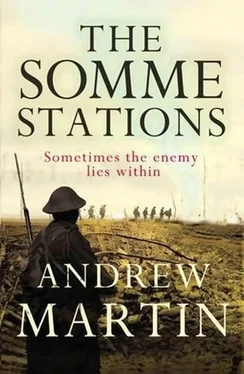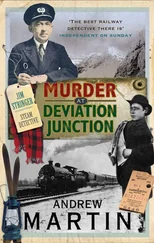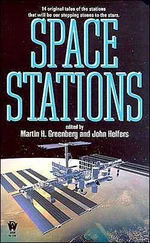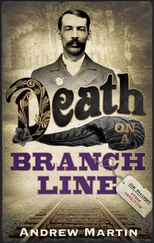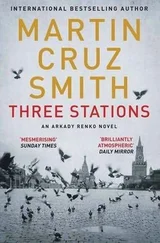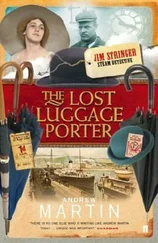‘They’ve done a decent job up to now,’ I said, for we’d had a smooth ride given the conditions. Tate began to speak but a shell came down, so he stopped and then started again: ‘Rather uncommunicative, that pair.’
The trees came around us, and formed up either side in their dead parade; a shell came into the woods causing a disturbance in the rear ranks of the trees and setting two fires. I was sweating. It was a hot night, though still raining somewhat. I looked back at our two passengers, and both Dawson and Butler gazed in the direction of the burning trees with a look of wonder. I was feeling a drag on the engine; I could see no incline, and I wondered whether Dawson had screwed down the brake a little, having been scared by our near-spill, or just in order to spite me. He was more of a brakesman than a guard, and his control of the brake was the only power at his command.
I saw a moving light ahead and what appeared to be the side rails of another girder bridge.
‘This is us,’ said Tate.
I knocked off the regulator, and we cruised up to the light, which gradually turned into a hurricane lamp held by Roy Butler – or was it Andy? Impossible to tell in the dark. The lamp gave a whitish glow. In their ganging days back in York, there would have been red and green filters. There would have been a ‘responsible person’ to stand in advance of them on the line, and they would have carried twice as many tools as they presently did. One held a shovel and fish bolt spanner, the other a mallet and a track gauge, for making sure two feet stayed two feet.
Oliver Butler braked his wagon, and climbed down to his brothers; Tate also jumped down, and he addressed the twins, I noticed, as though they were normal.
‘Well, we’ve had a fairly smooth run out… Anything in particular need of attention?’
The twins gave a shrug. They looked sidelong at their brother.
‘Come on now,’ said Tate, ‘what did you have to do?’
‘Tightening,’ said Andy, who held the spanner.
‘Flattening,’ said Roy, who held the mallet.
And then Andy, turning to Roy and laughing while squirming strangely, said, ‘… Frightening ,’ drawing the word out.
Tate looked up – I remained on the footplate – and frowned.
Tate said, ‘You’ve been having a warm time of it, have you?’
From behind the twins came a great bang – like somebody deciding that enough is enough – and a shell went climbing, scrambling into the air at hundreds of miles an hour. It was one of ours, there was a battery hard by but out of sight in the trees.
‘Place is in uproar!’ said Roy, and for once he did offer a direct glance at Tate.
Another shell was loosed from a bit further beyond.
‘Oh mother!’ said Andy, and now he too was looking directly at Tate, while grinning. Tate turned back to me, evidently knocked by the sight of Andy’s face. I heard the whistling in the black sky, over the broken trees. One was coming our way. I counted to five, and it came down a hundred yards off, and the only effect on us was a quantity of sticks blown towards the engine.
I heard the cracking of tree branches, and saw men coming towards us, rifles in hand. Four silent men, soaked in sweat and with tunics undone. They were from one or more of the gun placements. They contemplated the Baldwin with amusement, as it seemed to me. At the sight of the blokes, Tate called out, ‘Fusilier Dawson!’ and Bernie Dawson, who’d been sitting on the edge of his wagon, scrambled to his feet, saying, ‘Right, who wants some bombs?’
Tinsley was brushing some coal dust off the footplate, which was hardly necessary, and I contemplated with anxiety the thin twists of smoke and steam coming up from the chimney.
‘You know, I can’t believe she’d give us away,’ said Tinsley, seeing where I was looking. ‘Daft isn’t it?’
It was, but I knew what he meant. On the other hand, we were just another fire in the woods. There seemed to be several going on about us. The gunners, Dawson (with Woodbine on the go), and the twins had begun carting the shells to the guns. One man could lift one shell, just about. Oliver Butler was standing by his wagon. Lugging shells was beneath him, or so he thought, but Tate, who’d been scrutinising the wheels of the Baldwin, suddenly eyed Butler.
‘What are you doing, man?’
‘I’m superintending the train,’ came the reply. ‘It’s the first duty of the train guard.’
‘Well this is not the Scotch Express,’ said Tate. ‘Lend a hand with the shells.’
And so Butler picked up a shell, or tried to. He had a job to keep hold of it.
‘Want a hand?’ I said, my aim being not so much to help him as to save us being blown to buggery if he dropped it wrong end first. But he’d got a grip on it now, and fairly staggered off into the woods without replying. Tinsley, meanwhile, was peering at a particular tree, which I now saw had a short plank nailed to the upper trunk. He caught up the lamp that was hooked on the locker door. He jumped down from the footplate and held the lamp up before the tree. There were two words painted on the sign, and they came and went as the lamp swung.
‘Naburn Lock,’ he finally pronounced, in triumph.
Well, I knew Naburn Lock. It was only a mile or so south of Thorpe-on-Ouse – a popular spot with picnickers. The village of Naburn was picturesque, and there was a tea place at the lock. People would sit by it and watch the boats go through, marvelling at the pleasure cruisers of the York swells, and hoping one of them would collide with the lock gates, or somehow come a cropper.
The shell carters were now returning, having cleared the wagon. Tate, standing by the side of the Baldwin, had satisfied himself as to the soundness of the wheels. He said, ‘Naburn Lock, that’s right. Let’s have the lamp, and I’ll show you why.’
Tinsley handed him the light, and Tate walked over to the little ditch traversed by the track. The lamp showed a quantity of smashed and rotten wood in the black water. ‘A gate,’ said Tate. ‘A gate in the water – that’s what a lock is, so… Naburn Lock. My mother would take me there. We’d have ices at Martindale’s, and I’d watch the operation of the lock gates.’
That was the name of the tea rooms, and it was operated by a little old woman with a sweet face but a hunched back. She had some young assistants – generally one or two lasses who were real lookers – but I recalled that old Ma Martindale looked so frail, yet so anxious to please her customers, that you felt sorry for her rather than the opposite when the place was full.
Tate was climbing back up, and I was readying to pull the reversing lever (we would be returning to Burton Dump backwards), when I happened to glance over to Oliver Butler, who was standing by the wagon, eyeing the plank nailed to the tree, his brothers either side of him. All three looked mortified.
One – Roy, as far as I could make out in the gloom – was saying, ‘What’s going off , our kid? What’s to do ?’ and both were looking to their brother in search of an answer to something. Oliver Butler seemed about to speak – to address some remark to Leo Tate, as it seemed to me – before deciding at the last moment to keep silence.
Was it the naming of the halt that had bothered him?
‘Know Naburn Lock, do you?’ I called out, and the three Butlers turned to me as one man, while making no remark. ‘It’s a pretty spot.’
Of course, every railwayman in York knew the village of Naburn because the London line was carried over the river Ouse by a swing bridge just a little way outside it. ‘Decent pub in Naburn,’ I called out (for I seemed to be able to hold the three of them in suspension just by speaking of Naburn), ‘… The Horseshoe. It had a dining room and a dram shop but…’
Читать дальше
